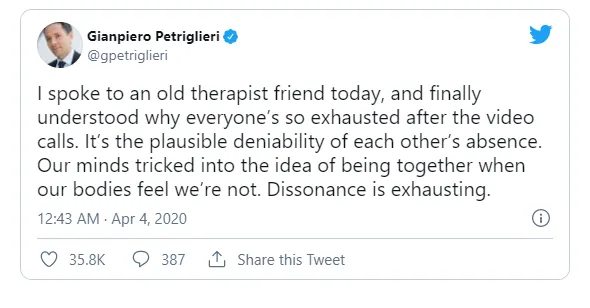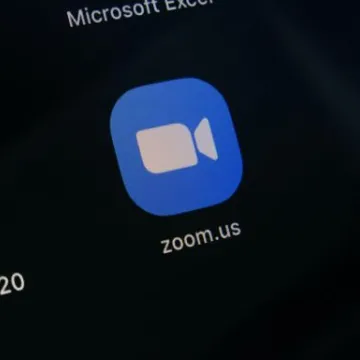60-Second Summary
Zoom fatigue is more than a buzzword - it’s a proven mental health challenge. Studies from Microsoft and cyber-psychology experts show that back-to-back video calls spike stress, drain focus, and lower productivity. Constant screen time causes eye strain, stiffness, and hyper self-consciousness from watching ourselves perform on camera. Our brains also struggle with the dissonance of “being together but not physically present,” making it harder to read non-verbal cues and leaving us emotionally exhausted. The fix? Limit unnecessary video calls, shorten meeting times, and schedule breaks to reset. Use alternatives like phone calls or email, hide self-view, or shift your screen off-center to reduce self-focus. Add movement, walking commutes, or creative downtime to offset the sedentary toll. Most importantly, build habits that separate work from screen time - stretching, exercise, or connecting offline. Video meetings are here to stay, but balancing them with mindful practices helps Sales Leaders, Revenue Professionals, and remote teams protect focus, creativity, and mental wellbeing.
---
Zoom fatigue is real. If you rely on video meetings to do your job, chances are, you will have felt the effects of this all too often.
It makes it difficult to concentrate, to stay motivated, and even to commit to an online get together with family and friends.
As social restrictions are relaxing and we start to come out of the global pandemic, life is beginning to return to relative normality. Zoom meetings, on the other hand, look very much like they’re here to stay.
The bad news is that scientists have found that constant Zoom meetings can be incredibly bad for our mental and physical health. The good news is that they have also found ways of managing these effectively.
We’ve done some research to show you what they found, and how you can manage your time more effectively to avoid Zoom fatigue.
Good reasons to get off Zoom and meet face-to face

Illustration by Brown Bird Design
- Research by Microsoft has found that back-to back video meetings are incredibly stressful for our brains. Jumping directly from one meeting to another can cause spikes of stress. Going back-to-back from meetings may feel like the only option, but cramming our diaries can be incredibly damaging in the long run. The research points out the importance of taking regular short breaks between meetings in order to be less stressed, exhausted and more focused and engaged. You can encourage this by setting shorter length video meetings by default and creating spaces between each meeting. Small behavior changes like these can increase mental wellbeing. Giving employees access to downtime activities can help people's brains to rest. When participants in the research study were given the opportunity to meditate and reset during their breaks, their average level of beta waves were steady and they could return to their next video meeting in a more relaxed state.
- Zoom has made us more sedentary. When you get your body moving again it can help manage your mental wellbeing. Walking, cycling or even taking the tube can help you feel better. A change of scenery is often what the doctor orders to have a break from the screen. Travelling to and from work can give you time to get daily steps in, think, read, listen to music or podcast. Or even prepare and reflect on a meeting.
- Zoom has made our bodies stiff and eyes dry and tired from constantly looking at our laptop, desktop or phone screens during meetings. Constant blue light isn't good for our health. Many Zoom calls could have had the same effect over phone, email or face-to-face (when we are allowed). If you can you should pick and choose whether a Zoom call is necessary to get the job done or whether you can achieve the same outcome through different channels.
- Watching ourselves talking during a Zoom meeting has made us more self-obsessed about the way we look and sound. Unflattering lighting and relying on filtered or tweaked screen images has been disheartening and made us hyper critical about ourselves. When you are at a Zoom meeting you can feel like you are on stage and need to perform. This can cause people to feel nervous, especially when they aren’t comfortable on camera. People can suffer a crisis of confidence.
Linda Kaye, a cyberpsychology researcher, suggests reasons behind feeling exhausted from video meetings stem from self-consciousness and trying to be aware of how we’re being perceived. Something that, when in-person, isn’t constantly part of our conscious behaviour.
Professor Gianpiero Petriglieri, an Associate Professor of Organisational Behavior, summed it up nicely.

Our brains have evolved to desire social contact. We also pick up a lot through non-verbal cues. When on a video call, we often lose the ability - or have to work harder - to identify these cues. Our minds are together, but our bodies are not - we are talking to a screen, but simulating social contact. This dissonance causes our brains to have conflicting feelings, leading to stress signals being sent out in the brain.
- Back-to-back Zoom meetings make us less productive, less focused and lower our mood and energy. It can make us feel claustrophobic as we aren’t leaving our homes as much. You can help this by trying to only use Zoom when it’s strictly needed or helpful. You can create good habits like taking a walk in your lunch break or after work. This can also boost your creativity levels. Scheduling things that make you happy and surrounding yourself with people that lift your mood are good for your mental health.
So, what should you do when told video calling is essential for productivity at work?
A. Cutting back on the amount of Zoom calls is a good place to start
B. Try to give space in between calls so they aren’t all back-to back
C. Have your screen off to the side, instead of straight ahead
D. Offer to do a phone call rather than a video call
E. Remove your tile, so you’re focusing on the conversation as opposed to yourself
F. Schedule activities during the week that takes you away from the screen (this can include stretching, having a drink or exercise)
Takeaway message for your mental health
Keeping connected is good for your mental health. Zoom is one method to communicate with your family, friends and workmates (but not the only way)! Working from home allows us to achieve more and schedule more meetings into a smaller time frame, but without regular screen breaks our brains can feel overwhelmed. If we can take 5 minutes or more between meetings it can help our brains reset. We should take this into account as video meetings play an even greater role in our daily lives.





.webp)






